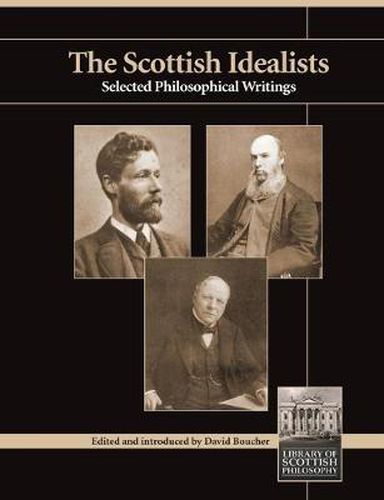Readings Newsletter
Become a Readings Member to make your shopping experience even easier.
Sign in or sign up for free!
You’re not far away from qualifying for FREE standard shipping within Australia
You’ve qualified for FREE standard shipping within Australia
The cart is loading…






This title is printed to order. This book may have been self-published. If so, we cannot guarantee the quality of the content. In the main most books will have gone through the editing process however some may not. We therefore suggest that you be aware of this before ordering this book. If in doubt check either the author or publisher’s details as we are unable to accept any returns unless they are faulty. Please contact us if you have any questions.
The extent to which British Idealism was heavily influenced by Scots has been little noticed, yet not only were they at the forefront of introducing Hegel into Britain in the work of Ferrier, Carlyle, Hutcheson, Stirling and Edward Caird, but they were also distinctive in locating themselves in relation to the Scottish philosophical tradition they sought to extend. The Scottish Idealists , among them Edward Caird, David George Ritchie, Andrew Seth Pringle Pattison, William Mitchell, John Watson, and the Welshman Henry Jones who found his spiritual home in Glasgow, comprised a formidable force and dominated the philosophical professoriate in Britain, Australia and Canada from the late nineteenth century to the years leading up to the First World War. Its main centres were St. Andrews, Glasgow and Edinburgh in Scotland, Cardiff in Wales, and Oxford in England. This collection of readings, the first of its kind, has been chosen with a view to displaying the variety, richness and strength of the Scottish Idealist tradition, beginning with an essay from the famous Essays in Philosophical Criticism (1883), a book that set-out the future direction of enquiry for this group of thinkers who shared a ‘common purpose or tendency’. Scottish Idealism was immensely spiritual in character and recognized no hard and fast distinctions between philosophy, religion, poetry and science. It was a formidable force in social and educational reform.
$9.00 standard shipping within Australia
FREE standard shipping within Australia for orders over $100.00
Express & International shipping calculated at checkout
This title is printed to order. This book may have been self-published. If so, we cannot guarantee the quality of the content. In the main most books will have gone through the editing process however some may not. We therefore suggest that you be aware of this before ordering this book. If in doubt check either the author or publisher’s details as we are unable to accept any returns unless they are faulty. Please contact us if you have any questions.
The extent to which British Idealism was heavily influenced by Scots has been little noticed, yet not only were they at the forefront of introducing Hegel into Britain in the work of Ferrier, Carlyle, Hutcheson, Stirling and Edward Caird, but they were also distinctive in locating themselves in relation to the Scottish philosophical tradition they sought to extend. The Scottish Idealists , among them Edward Caird, David George Ritchie, Andrew Seth Pringle Pattison, William Mitchell, John Watson, and the Welshman Henry Jones who found his spiritual home in Glasgow, comprised a formidable force and dominated the philosophical professoriate in Britain, Australia and Canada from the late nineteenth century to the years leading up to the First World War. Its main centres were St. Andrews, Glasgow and Edinburgh in Scotland, Cardiff in Wales, and Oxford in England. This collection of readings, the first of its kind, has been chosen with a view to displaying the variety, richness and strength of the Scottish Idealist tradition, beginning with an essay from the famous Essays in Philosophical Criticism (1883), a book that set-out the future direction of enquiry for this group of thinkers who shared a ‘common purpose or tendency’. Scottish Idealism was immensely spiritual in character and recognized no hard and fast distinctions between philosophy, religion, poetry and science. It was a formidable force in social and educational reform.